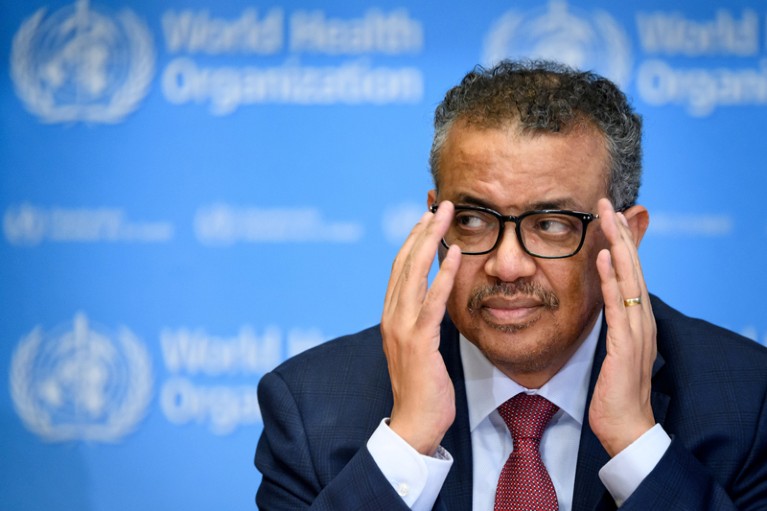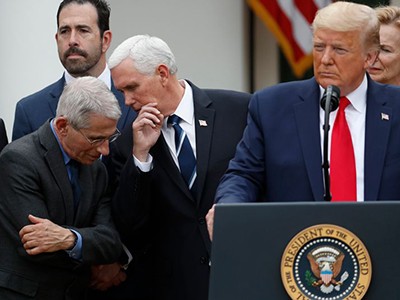
World Health Organization director-general Tedros Adhanom Ghebreyesus has said the agency regrets the US decision to withdraw funding.Credit: Fabrice Coffrini/AFP/Getty
Amid the biggest global health crisis in a century, it is dangerous to hurt the one intergovernmental agency most able to guide the world out of it. But that is precisely what happened this week.
On the orders of President Donald Trump, the United States, one of the key founding members of — and the largest donor to — the World Health Organization (WHO), announced its intention to freeze its funding for the agency, pending a review of WHO actions during the coronavirus pandemic. The review could last for up to three months.
Trump’s administration has been increasingly critical of the agency, which for months has guided the world in how to tackle the deadly coronavirus. That work — and the WHO’s other life-saving interventions around the world — will be at risk if the agency loses its US funding, which amounted to nearly US$900 million for 2018–19.
It isn’t yet clear whether the White House can withhold this funding — especially the portion that has been approved by the US Congress — and if so, how much it can keep back. But even talk of doing so in the middle of a global health and economic crisis cannot be condemned strongly enough.

Researchers: show world leaders how to behave in a crisis
De-funding the WHO is especially dangerous for those low-income countries in which the agency’s work is crucial to maintaining standards of public-health infrastructure, and also to tackling killer diseases. The WHO’s epidemiologists, clinicians and logistics personnel are right now overseeing more than 35 emergency operations, including a measles outbreak in the Democratic Republic of the Congo and a cholera outbreak in Yemen.
On top of its emergency operations, the WHO handles ongoing efforts to treat tuberculosis and diabetes; eradicate polio; and study tropical diseases. This is all on an annual budget of roughly $2.4 billion. Of this, the WHO’s emergency-response budget is approximately $280 million. By contrast, the agency that tackles public-health emergencies in the United States — the Centers for Disease Control and Prevention — has a total budget of around $12.7 billion this year.
Finding the balance
A pandemic is always a big test for the WHO. In previous health emergencies, the agency has been criticized for acting too slowly, or — in the case of the 2009 H1N1 influenza pandemic — overstating the risks. But leading public-health researchers and practitioners agree that, so far in the current crisis, the agency has offered leadership and acted according to the evidence it has received.
The WHO was notified of a cluster of pneumonia cases by China on 31 December, and it began an emergency-response process the following day. Its many actions since then include posting and updating guidance on how to diagnose COVID-19, vetting diagnostic tests and distributing them around the world. The agency’s science division convened world experts to survey potential therapeutics. From this, it developed an adaptable clinical-trial protocol, known as SOLIDARITY, that has been launched globally.
More recently, the WHO has set up a supply-chain management system to try to ensure that low-income countries are not left without tests, medical equipment or protective gear for health workers — given the fierce competition for these limited resources.
The WHO declared a public health emergency of international concern, or PHEIC, on 30 January. That announcement is a trigger for the agency’s member governments to follow its recommendations. These include establishing a comprehensive programme of testing, quarantining people suspected to be infected, and tracing their contacts.
Some countries acted quickly, including Germany, Singapore and South Korea. But the United States is among those that has not followed these particular recommendations. Even now, it does not have a national infrastructure for testing for the virus, nor for tracing the contacts of those infected with it.
In early March, WHO director-general Tedros Adhanom Ghebreyesus pleaded with the world when he said: “You can’t fight a virus if you don’t know where it is. That means robust surveillance to find, isolate, test and treat every case, to break the chains of transmission.”

Coronavirus: three things all governments and their science advisers must do now
But the Trump administration chose not to follow the WHO’s advice. Instead, influential lawmakers have been calling for an investigation into the WHO’s actions, claiming that the agency was too slow to sound the alarm and too deferential to the Chinese government. At the same time, they are implicating the WHO in wider questions being directed at China’s government. These include that China could have acted more quickly to lock down in the days after the first outbreak, and that public officials withheld important information. Such questions must be asked of China, but they are not for the WHO — which acts at the behest of governments — to answer. And they are not reasons to de-fund the agency.
It is, of course, crucial that lessons are learnt from all stages of this pandemic. Once it is over, there will be many national and international investigations and inquiries — including the WHO’s own — and these will uncover what went right, what went wrong and what could have been done better. It is always tough to operate in a pandemic, and tougher still when essential cooperation between governments is at a low ebb. Such inquiries will be an opportunity to improve and to grow. They are not a reason to undermine or attack.
This pandemic needs the world to follow a coordinated plan, covering decisions including how and when lockdowns are to be relaxed. It is extraordinary that more than three months into the outbreak, such a plan is nowhere to be seen. On 19 April, the health ministers of the G20 group of nations will meet virtually. When they do, they must put such a plan in place. The best hope of achieving that is for all nations to work with the WHO and other international agencies.
It is right that researchers, funders and governments have been protesting against Trump’s decision, and they must continue to do so in the strongest terms. Those in the United States must also lobby their lawmakers at every level. The president and his administration must not withhold funding from the WHO. Doing so will place more lives at risk and ensure that the world takes longer to emerge from this crisis.
Nearly 70 years ago, the United States was instrumental in helping to establish the WHO. Nations realized that they needed such an agency in part because they couldn’t tackle pandemics by acting alone. It is a sad indictment of the state of our world that the agency is now having to fight for its future while doing the job it was created to do.
We need to support the WHO so it is at its strongest, not undermine it at such a crucial hour.

 Latest news on the coronavirus outbreak
Latest news on the coronavirus outbreak  Coronavirus: three things all governments and their science advisers must do now
Coronavirus: three things all governments and their science advisers must do now  Researchers: show world leaders how to behave in a crisis
Researchers: show world leaders how to behave in a crisis 




